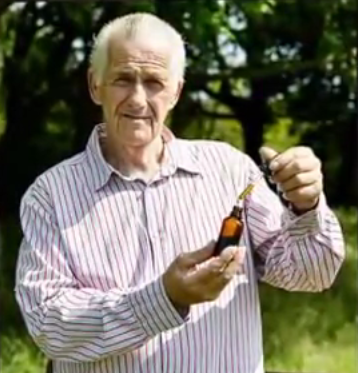Marijuana Can Kill Cancer Cells? This Grandfather Allegedly Cured Liver Cancer With Homemade Cannabis Oil

Cancer can evolve into a disease so debilitating that it quickly overcomes the immune system and numbers a patient's days, if untreatable. A 63-year-old grandfather from the UK did not let his liver cancer diagnosis define him, as he sought an unconventional and controversial form of treatment — cannabis.
Mike Cutler, two-time liver cancer survivor, claims to have cured his liver cancer after looking on the Internet, specifically YouTube, where he found a video promoting the use of cannabis oil. “Finding out I could die was terrible. All I had in those dark days was my laptop, and that’s when I began searching for something else that could help me,” Cutler told SWNS.com. “I couldn’t accept I was going to die.”
The cancer survivor was first diagnosed with liver cancer in 2009 after he blacked out at work, after which he then received an organ transplant in November of that year. However, last year, his health took a turn for the worst when he found out new cancerous cells were attacking his new organ.
Although Cutler’s type of primary liver cancer remains undisclosed, hepatocellular carcinoma is the most common type among adults. In the U.S., primary liver cancer is twice as common in men than in women, says the American Liver Foundation, with chronic alcoholism and hepatitis C leading to cirrhosis, which is linked to liver cancer. A transplant is often a form of treatment if the cancer has not spread to other organs, like in Cutler’s case.
A liver transplant and a second cancer diagnosis later, Cutler decided to buy marijuana from a dealer and make his tablets from the oil to treat his condition. The grandfather admits that after three days of taking one capsule, his severe pain disappeared and eventually began to cough up blood, which he believes contained the dead cancer cells. “I can’t believe cannabis oil isn’t being used regularly as treatment. It is a miracle cure. The NHS should use it — it would save money,” Cutler said.
Since his discovery, Cutler has spoken about the medical use of cannabis along with Professor David Nutt and MP Caroline Lucas at Brighton Community Centre last week. This coincides with a study published last week by researchers from the University of East Anglia who found tetrahydrocannabinol, or THC, the main ingredient in cannabis, successful in slowing the growth of cancerous cells. Dr. Peter McCormick, from the university’s School of Pharmacy, cautioned: “Cancer patients should not self-medicate, but I hope that our research will lead to a safe synthetic equivalent being available in the future.”
Despite McCormick’s advice, cancer patients like Cutler have gone their own route and have seen success. Cutler confirms when he went for a biopsy in May this year at the Royal Free Hospital, London, he said doctors told him the new cancerous cells had disappeared. A spokeswoman from the hospital confirmed he has not received any cancer treatment since his transplant in 2009, the Daily Mail reported.
Now Cutler is campaigning overseas for changes in the law to legally allow the oil, and other forms of cannabis to be used medicinally to treat other people. In the U.S., medical marijuana has gained plenty of support, as New York State recently became the 23rd state to legalize the substance's medicinal use. While accounts of cancer patients using medical marijuana to kill cancer cells are scarce, research is growing in support of the beneficial effects of the drug not just in cancer but other diseases, like epilepsy.
Further clinical trials are needed to prove the efficacy and safety of using marijuana to treat a variety of diseases.



























